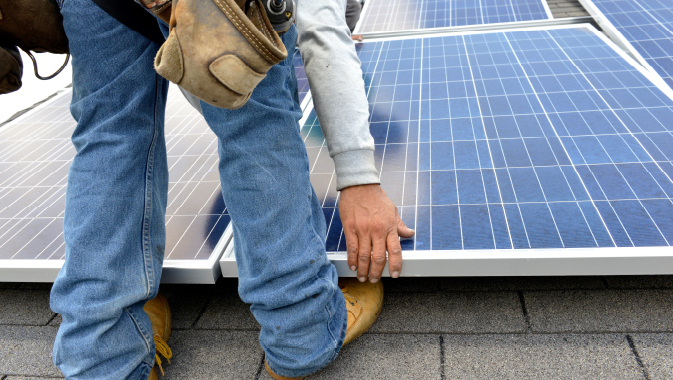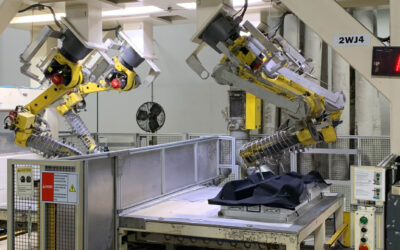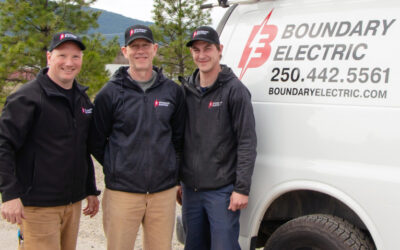PosiGen provides solar and energy efficiency solutions with a unique approach. Rather than customizing solar products for individual houses, the company offers three separate sizes that work for every customer. The size of the system installed on a house is based on the consumption of energy in the home and the total roof size available considering shading issues. This method allows PosiGen to drive its cost of installing solar down lower than any other company in the industry.
~
“We install solar about 30 percent more cheaply than the industry average right now, and that allows us to provide greater savings to our customers,” says Thomas Neyhart, CEO. “And pairing energy efficiency with every solar install that we do creates that much more savings for the customer.”
To offer a full range of energy efficiency solutions, PosiGen first seals the vents to perform blower door and duct blaster tests to determine how much air exchange there is between the interior and exterior of the home and how much air is escaping through the ductwork into the attic. The team then seals the building envelope and repairs the ductwork and seals, the plenum, and air return; replaces all incandescent bulbs with LEDs; installs a programmable thermostat; installs attic knee wall insulation; blows cellulose insulation into the attic; and puts an insulation sleeve on the hot water heater.
“We are working on making the house not only more energy efficient but also healthier. We’re cutting down the amount of moisture intrusion, spores, mold, dust, et cetera that comes in, making it more comfortable and getting rid of the hot and cold spots as well as the drafts,” says Neyhart.
In 2011, six years after Hurricane Katrina, residents in Louisiana continued to struggle with rebuilding their homes, and PosiGen was founded to equip these families with solar and energy efficiency programs that would have an immediate positive financial impact. At the time, solar programs were designed to help the environment or to give residents peace of mind about future payments, but not necessarily to return immediate savings. PosiGen set out to find a way for solar to put an average of $500 a year back into families’ pockets right away by combining solar and energy efficiency together.
The business tax credits and incentive programs in Louisiana enabled the company to turn this concept into a reality; however, it was challenging to explain to financial partners that the plan was to focus on deployment in low-income neighborhoods. Working with families that have lower incomes regardless of credit score did not resonate well in an industry that was already focused on serving expensive homes owned by people with credit scores of 750 or higher and household incomes of at least $150,000. “Our idea that this would be a utility replacement, that credit scores didn’t really matter, and that ‘the lower the income the better because the bigger the impact,’ just wasn’t something people were ready for at the time,” explains Neyhart.
As part of a team effort to address the challenge of raising initial capital, PosiGen Co-Founder Aaron Dirks joined the effort, and the company was able to borrow funds from a local bank to go out and install a few hundred systems. PosiGen was able to prove that there is indeed a high demand in this underserved population, and that there is a great amount of immediate savings possible. In some of the older homes, the solar and energy efficiency solutions provided up to $1,000 in annual net savings for those customers.
PosiGen’s success attracted the attention of US Bank, which has a background in community development, and it provided the emerging company with its first injection of “tax equity” (that is, investment dollars associated with the federal 30 percent solar Investment Tax Credit). From that point on, business took off and has not slowed down since. “We went from installing maybe 500 systems in 2012 to installing over 1,500 systems in 2013 and over 2,000 systems in 2014 – and we’ve never looked back,” says Neyhart. To date, the company has served 14,000 families, and over 70 percent of its solar installations are still performed in low-income census tracts. Fortunate to find great financial partners along the way, PosiGen is grateful for its relationships with LibreMax, Capital One, GAF, Callais Capital, Connecticut Green Bank, and others.
These partnerships have allowed PosiGen to accelerate its growth in Louisiana, Connecticut, and New Jersey, and to continue helping the families and communities that need it most. “If you make 30,000 dollars a year and have three kids in school, and we can put $500 to $700 a year back into your pocket, that 50 or 60 dollars a month has a real impact when it goes toward buying school supplies or groceries,” says Neyhart.
Make no mistake, PosiGen is a for-profit company with stockholders, and it is concerned with ROI, but it is a firm that lives by its mission, which includes four pillars, starting with not only making a positive financial impact on the future of families’ lives but also making a positive financial impact in the broader community.
To this end, PosiGen has installed 2,790 systems in New Orleans East, and the average customer in that neighborhood is now saving approximately $52 a month. That money does not go into a 401(k) or into a stock portfolio; instead, it is spent in the neighborhood at the local grocery store, pharmacy, or the cleaners. “Economists say every dollar that is spent in a low-income community churns 3.9 times, and when you multiply that by 2,790 families and multiply it by 12 months, all of a sudden you see that PosiGen is having a $6,000,000 a year impact on the New Orleans East community, which is a very low-income census tract,” explains Neyhart.
Roughly 42 percent of the business at PosiGen comes from customer referrals, as people have a tendency to discuss the positive changes in their lives and want to help their community.
PosiGen is also creating jobs and business opportunities in low income communities, which is the basis of the third pillar of its mission: to hire the same people it serves. Over 65 percent of its employees are persons of protected class and in many cases, its customers choose to apply for work at PosiGen after their homes see the benefit of solar installations and energy efficiency upgrades. During employee meetings, when the question is asked, half of the room raises their hand to state that they had been a customer before coming to work for the company. Dedicated to paying its people a living wage, PosiGen offers a competitive starting wage, pays 75 percent of all employee benefits, and matches employee contributions to their 401(k) plan dollar for dollar. The company is proud to state that its employees have collectively saved over $3,000,000 for their own futures.
The fourth pillar of PosiGen’s mission takes employment one step further by building strong and reliable career opportunities for staff. One team member, Caitlin, began in the telemarketing department before working her way up to Team Lead and moving into an administrative role. She then became involved in marketing and ultimately became the Marketing Manager for the entire company across all three states with an annual budget of close to $2,000,000 to manage.
PosiGen also helps to create career opportunities in the community by working with at-risk youth each year through its summer internship program. Students learn about the company’s mission in a classroom setting as well as on site and in the end, one is selected for a scholarship award.
Thanks to its financial partners, PosiGen expects to see a large increase in the number of families it will be able to serve this year. The company is currently working to raise additional corporate equity to further its growth and create partnerships that will allow it to service low-income communities in other states. This is key, as PosiGen believes that reducing energy costs for low-income families should be a focus for the renewable industry in every state. It is easy to sell expensive solar products to the wealthy, but the positive effects of serving “underinvested communities” are undeniably beneficial to society as a whole.
“The amount of deployable solar in the U.S. on low-income homeowners’ houses is 342 gigawatts,” says Neyhart. “Think about the impact that would have across the nation if we could figure out a program that would consistently be able to deliver solar and energy efficiency to these customers.” The efficient cost structure at PosiGen enables it to install a solar system that is cash flow positive on day one and this is a concept that should be adopted by more solar companies. PosiGen’s customer acquisition costs are $4,500 lower than the industry average, and its installation costs are $3,000 dollars less than average, making its model very accessible.
PosiGen is always on the lookout for emerging innovative technology to broaden its offering and save its customers the most amount of money possible. “We always say, ‘we don’t have to make every dollar, but we have to save our customers every dollar,’” says Neyhart. PosiGen has proven that the concept of supplying solar to low-income homeowners is profitable, and it has developed a model worth emulating. “You hate to ask for competitors, but we can’t be everywhere, and this program needs to be available for everybody out there.”













